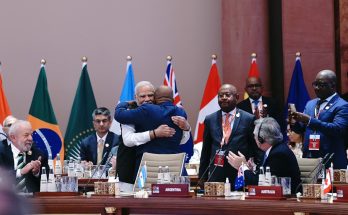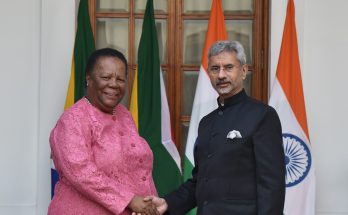
Nigeria’s India-educated President Muahammadu Buhari is an incorrigible optimist. He is not deterred by narratives of Afro-pessimism or Africa Rising?, sparked by plunging commodity prices and festering violence in swathes of the continent, but is determined to ensure that the rising of Nigeria is real and lasting.
A few hundred kilometres away, Mali, ravaged by savage terrorism, is trying to script its own resurgence amid formidable challenges. Against this backdrop, Vice-President Hamid Ansari heads to Nigeria and Mali to chart new pathways of cooperation to aid ongoing national reconstruction in these two important partners of India in West Africa.
Mr Ansari’s visits to Nigeria and Mali (September 26-30) underscore India’s strategic design to expand its footprints in the West Africa region, which had not hitherto loomed high on India’s diplomatic canvas. But this diplomacy deficit is now being addressed proactively. President Pranab Mukherjee visited Ghana and Cote D’Ivoire in June, and there are plans for Vice-President Ansari to visit Senegal later this year.
 The Modi government has stepped up engagement with the resurgent African continent, which was crystallised in ambitious outcomes to deepen the India-Africa partnership at the third India-Africa Forum Summit in October 2015. Since then, there have been a spate of high-profile visits from India to various countries in Africa, including by Prime Minister Narendra Modi to four African countries in July, making 2016 the year of Africa in India’s diplomacy. By the end of the year PM Modi, President Mukherjee and Vice-President Ansari would have visited 13 African countries – a record outreach to Africa by India in the last few decades.
The Modi government has stepped up engagement with the resurgent African continent, which was crystallised in ambitious outcomes to deepen the India-Africa partnership at the third India-Africa Forum Summit in October 2015. Since then, there have been a spate of high-profile visits from India to various countries in Africa, including by Prime Minister Narendra Modi to four African countries in July, making 2016 the year of Africa in India’s diplomacy. By the end of the year PM Modi, President Mukherjee and Vice-President Ansari would have visited 13 African countries – a record outreach to Africa by India in the last few decades.
Why Nigeria matters
Africa’s most populous country and the continent’s largest economy has a special place in India’s diplomatic calculus. Given multifarious relations bound by business, energy, educational and cultural ties, Mr Ansari’s visit to Abuja and Lagos is set to impart a fresh momentum to economic and strategic partnership between the two countries. He is set to engage the top leadership, including President Buhari and his host, Vice-President Prof. Yemi Osinbajo.
What’s on agenda?
 The talks in Abuja are expected to focus on upscaling energy partnership and diversifying the economic relationship, which has been dominated by Nigerian oil exports to India. Nigeria is pivotal to India’s energy security and accounts for nearly 12 per cent of India’s total oil supply. Nigeria is currently the third top supplier of oil to India, after Saudi Arabia and Iraq. The two sides are expected to transform the energy relationship from the buyer-seller relations to that of a comprehensive strategic energy partnership that could entail Indian companies’ investment and involvement in development of pipelines and oil-related infrastructure. India is planning to increase the term contract from 1.7 million tonnes per annum to three million tonnes of oil from Nigeria.
The talks in Abuja are expected to focus on upscaling energy partnership and diversifying the economic relationship, which has been dominated by Nigerian oil exports to India. Nigeria is pivotal to India’s energy security and accounts for nearly 12 per cent of India’s total oil supply. Nigeria is currently the third top supplier of oil to India, after Saudi Arabia and Iraq. The two sides are expected to transform the energy relationship from the buyer-seller relations to that of a comprehensive strategic energy partnership that could entail Indian companies’ investment and involvement in development of pipelines and oil-related infrastructure. India is planning to increase the term contract from 1.7 million tonnes per annum to three million tonnes of oil from Nigeria.
Energising Ties
Diversifying economic relationship with Nigeria has acquired an added impetus as more than 90 per cent of around $14 billion bilateral trade comprises oil imports by India. India is Nigeria’s largest trading partner and Nigeria is India’s largest trading partner in Africa. More than 100 companies are thriving in Nigeria, which are owned or operated by Indians or Persons of Indian origin. These companies, among others, include Bharti Airtel, Indorama, Olam International (now Singapore registered), Tata, Bajaj Auto, Birla Group, Kirloskar, Mahindra, Ashok Leyland and Godrej. Pharmaceuticals, steel and power transmission are sectors where Indian companies have made a special mark. Indian companies are also the second largest employers in Nigeria.
Looking ahead, there are new opportunities for Indian companies in diverse sectors, including infrastructure, IT and medical tourism. Nigeria’s infrastructure deficit is estimated to be $70 billion per year. With President Buhari encouraging foreign companies to invest in infrastructure in Nigeria, new avenues are set to be opened for win-win deals. In his address at the joint business forum in Lagos, the vice-president is expected to make a strong pitch for upscaling and diversifying trade and investment.
Development Partnership
Development cooperation, pivoted around capacity building, training and human resource development, defines and animates India’s engagement with Africa. In both Nigeria and Mali, enhancing development partnership will be an important focus area. India provided $100 million in Lines of Credit to Nigeria for three power projects during then Prime Minister Manmohan Singh’s visit to Abuja in 2007. This time round, India may also unveil fresh lines of credit for development projects in Nigeria. In Mali, India is expected to announce new Lines of Credit for the reconstruction of the West African nation that has been ravaged by Islamist insurgents. India has played an important role in Mali’s reconstruction efforts and has extended 7 LoCs amounting to US$ 353.60 million to Mali.
Think Strategic: Focus on counter-terrorism

Besides enhancing economic ties and development cooperation, the vice-president is expected to focus on imparting a strategic traction to India’s relations with Nigeria and Mali. Intensifying counter-terror cooperation will be on top of the agenda in both Abuja and Bamako. Given incestuous linkages between radical Islamist groups across the world, India is concerned about possible spill-over effects of terrorism unleashed by Boko Haram in Nigeria and al-Qaeda in the Maghreb in Mali. India supports the ongoing reconciliation process in Mali and is expected to announce assistance focused on upgrading counter-terror apparatus in the West African state.
Isolating Pakistan in OIC
The vice-president will also be seeking support of Nigeria and Mali, members of the Organisation of Islamic Conference (OIC), which forms the diplomatic support base of Pakistan on the Kashmir issue, for India’s campaign to isolate Pakistan in the wake of the terror attack in north Kashmir that killed 18 Indian soldiers. As these countries are themselves victims of terrorism, India will be looking for strong condemnation of the Uri attack and Pakistan-sponsored terror from the leadership in both Nigeria and Mali.
The Way Ahead
Taking a long-range view, the vice-president’s visit to the two West African countries underlines India’s determination to raise the bar for its burgeoning partnership with the African continent. China’s growing economic presence in West Africa is another strategic imperative for India to raise its game in the region. With a growing convergence of economic and strategic interests, India’s outreach to West Africa and the African continent is set to acquire a new narrative and resonance in days to come.
(Manish Chand is CEO and Editor-in-Chief of India Writes Network, an e-magazine-journal focused on international affairs, Africa and China. He is part of the media delegation accompanying Vice-President Hamid Ansari to Nigeria and Mali)
Author Profile

- Manish Chand is Founder-CEO and Editor-in-Chief of India Writes Network (www.indiawrites.org) and India and World, a pioneering magazine focused on international affairs. He is CEO/Director of TGII Media Private Limited, an India-based media, publishing, research and consultancy company.
Latest entries
 India and the WorldJuly 9, 2024Defying West, India sets $100 billion trade target with Russia
India and the WorldJuly 9, 2024Defying West, India sets $100 billion trade target with Russia India and the WorldJuly 5, 2024India at SCO: Takes swipe at Pakistan for cross-border terror, pushes alternative to BRI
India and the WorldJuly 5, 2024India at SCO: Takes swipe at Pakistan for cross-border terror, pushes alternative to BRI India and the WorldJune 14, 2024Modi’s Day 1 in Italy: Bonding with Britain, France
India and the WorldJune 14, 2024Modi’s Day 1 in Italy: Bonding with Britain, France India and the WorldJune 13, 2024G7 summit in Italy: Modi to showcase India as leader of Global South
India and the WorldJune 13, 2024G7 summit in Italy: Modi to showcase India as leader of Global South






